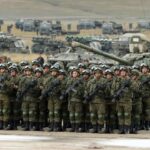Summary by Geopolist | Istanbul Center for Geopolitics:
Donald Trump’s recent geopolitical realignment, which has drawn the United States closer to China and Russia while distancing it from European allies, has created both opportunities and risks for Chinese President Xi Jinping. A key indicator of this shift was a U.S.-led UN Security Council resolution, supported by both Russia and China, that called for an end to the war in Ukraine without assigning blame to Moscow. In contrast, France and the UK abstained, reflecting a growing divergence between Washington and its traditional European partners.
Trump’s embrace of transactional diplomacy has led analysts to speculate that he may be more willing to negotiate with China on trade, export controls, and even Taiwan. However, Chinese officials remain cautious, suspecting that Washington’s outreach to Moscow could be a strategic maneuver to weaken Beijing’s alliance with Russia. Some observers have likened this to a “reverse Nixon” strategy, where the U.S. could attempt to pull Russia away from China, mirroring Nixon’s Cold War-era engagement with China to counter the Soviet Union.
For Russia, warming ties with the U.S. could help reduce its reliance on China, particularly after Western sanctions severed many of its trade links with the European Union. While Russia’s trade with China reached a record $245 billion last year, it still falls short of its pre-war trade volume with the EU. Analysts suggest that diversifying economic ties would be in Moscow’s interest, but deep-rooted strategic cooperation between Xi and Putin makes a significant rupture unlikely.
Despite speculation about shifting alliances, Xi reaffirmed China’s strong ties with Russia in a recent call with Putin, emphasizing their “true friendship” and commitment to shared strategic interests. Chinese scholars recognize that any agreement with Trump could be reversed by a future U.S. administration, adding to the uncertainty of Beijing’s long-term foreign policy calculations.
Trump’s realignment has also raised concerns about U.S. commitments to its allies, particularly Taiwan. Some analysts argue that Xi could interpret the U.S. decision to negotiate directly with Russia over Ukraine—without Ukrainian involvement—as a precedent for similar talks over Taiwan. While Beijing may welcome concessions from Trump, Xi’s primary focus in any negotiations would likely be on easing U.S. economic measures against China.
Amid Trump’s growing rift with European leaders, China sees an opportunity to improve its own standing in Europe. Some experts believe Beijing could exploit tensions within the transatlantic alliance to strengthen economic and diplomatic ties with the continent. In this context, some have suggested that Xi might attempt to outmaneuver Putin by securing a high-profile meeting with Trump before the Russian leader does.
Ultimately, while Trump’s pivot away from Europe has created new diplomatic openings for China, it also introduces volatility. Beijing must navigate the uncertainty of U.S. foreign policy while balancing its strategic partnership with Russia, its economic interests in Europe, and its long-term rivalry with Washington.
Read more here.







